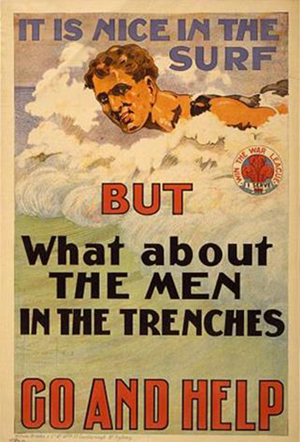
World War I and The Art of War: Posters from the Collection of Oscar Jacobson
Posters and Propaganda

British poster (image courtesy of the Library of Congress).17
Propaganda is defined by the Merriam-Webster Dictionary as "ideas, facts, or allegations spread deliberately to further one's cause or to damage an opposing cause."
Propaganda takes several forms: it can be a celebrity endorsing a product, an advertisement on television or in the newspaper, a sign in the neighbor's yard supporting a politician, a political cartoon, just about anything! During World War I, the majority of propaganda from all sides was in the form of posters. Posters were popular and the artists' designs were eye-catching and easily reprinted. Posters could also reach several people in multiple locations.
These posters encouraged people to be informed and get involved in the war effort. They asked men to join armed forces and women to join relief organizations. They inspired people to buy bonds and help others around the world. The posters helped generate a real fear of the enemy, and helped raise support for the war in several countries and on all sides. The following are some examples of posters issued from the Allied and Central powers governments.

Australian poster (image courtesy of the Library of Congress).18

Shall We be more Tender with Our Dollars, Dan Sayre Groesbeck (image courtesy of the The National WWI Museum and Memorial).19

British poster (image courtesy of the Library of Congress).20

Enlist/On Which Side are You? 1917, Laura Brey (image courtesy of Smithsonian Magazine).21

(Image courtesy of the University of Leeds.)22
Central Powers Propaganda Posters

Translation: "You, too, should join the Reichswehr. Therefore, sign up at the next enlistment post, Reichswehr-Gruppen-Kommando no. 4 (Bavarian), Möhl, Major General" (image courtesy of the Library of Congress).23

Translation: "Help Us Win! Subscribe to the War Loan" (image courtesy of The National WWI Museum and Memorial).26

Translation: "This is how it would look in German lands if the French reached the Rhine" (image courtesy of the Imperial War Museums).25

Translation: "Imperial and Popular Fund for the Army and the Navy. Frankfurt Christmas Charity Day 1917. Contributions to 14 Theaterplatz, Office 5" (image courtesy of the Imperial War Museums).27

Translation: "If the enemy's hate and army win, the workplaces will stand empty. Before closed doors, you'll have to tie up your bundles in hunger" (image courtesy of the Imperial War Museums).28

Poster showing Allied soliders running from German troops. Translation: "We Teach You to Run!" (image courtesy of Boston University).24





